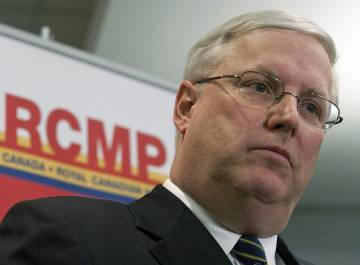
In cases of police-involved death, civilian oversight bodies or external forces will be called in as a matter of policy, commissioner says

Commissioner William Elliott announces new internal investigations policy at RCMP headquarters in Ottawa on Thursday, Feb 4, 2010.
Colin Freeze
From Friday's Globe and Mail Published on Thursday, Feb. 04, 2010 11:04PM EST Last updated on Friday, Feb. 05, 2010 3:24AM EST
Civilian oversight bodies, where they exist, will be called in to look at what went wrong and whether to press charges. In provinces where such bodies don't exist, other police forces will be drawn upon. In the Far North, Mounties will have to continue to investigate their colleagues because so few other police forces exist there.
It is not unusual for Mounties to call on outside police forces to investigate misconduct, but it has been a matter of discretion rather than policy – until now.
“The RCMP must strive to be as open and transparent as possible,” Mr. Elliott told reporters Thursday in Ottawa.
The first civilian appointed to head the police force, Mr. Elliott added that “we collectively need to raise the bar in terms of how we respond to situations where life is lost [or] serious injuries sustained.”
The hope is the policy shift will help insulate the RCMP from perceptions of bias and cover-ups. Observers characterize the new policy as a “goodwill gesture” meant to restore public faith, though they caution more needs to be done.
For decades, judicial commissions have urged the RCMP to be more accountable, and the force's image has suffered after the deaths of prisoners taken into their custody.
The death of Polish immigrant Robert Dziekanski after tasering by RCMP officers at Vancouver Airport also raised public mistrust.
These cases led to allegations of police misconduct, but failed to result in criminal charges. That Mountie detectives participated in investigations of Mountie suspects helped foster perceptions that the system was rigged.
Vic Toews, the newly appointed Public Safety Minister, suggested Thursday that more changes are coming.
“This government will continue its work on measures to reform and strengthen our national police force,” he said.
Mr. Elliott's new policy follows a slate of recommendations put forward by the RCMP complaints commissioner last year.
“It's a good faith gesture on his part,” said Paul Kennedy, the RCMP complaints commissioner whose term was not renewed by the Conservatives in December.
“It's a step, but there are many more steps to be taken,” Mr. Kennedy said in an interview.
He pointed out the policy shift doesn't have the force of law, as he had recommended, and that will be for federal and provincial legislatures to decide.
Misconduct scenarios do not always include allegations of police-involved death or serious injury, and the lines between police action and consequence are sometimes blurred.
In 2006, a federal judicial inquiry urged greater oversight of RCMP national-security investigations, after finding that unfounded suspicions on the part of the Mounties allowed a Canadian citizen to be wrongly tortured in Syria as an al-Qaeda suspect.
The Maher Arar commission led to $10-million in federal compensation, but no censures of individual detectives.
Paul Cavalluzzo, the lawyer who shepherded along the Arar inquiry, said Thursday that Mr. Elliott's announcement is “a good first step, but it's a baby step.”
“This has absolutely nothing to do with what Justice [Dennis] O'Connor said in the Arar report,” he said in an interview, adding that an oversight model proposed four years ago has yet to become a reality.
The policy shift announced Thursday followed months of consultations between the RCMP brass and the rank and file.
Many officers appeared to be onside.
“There's no advantage for a police officer to have the public believe that police are covering up for one of their own,” said Staff Sergeant Abe Townsend, of the RCMP staff relations program, which acts like a union for Mounties.
“We don't want to see the public lose faith.”
It's taken 127 years for the RCMP to finally making the order that they
should not investigate themselves.
There is nothing more disgusting and revolting than the news that members of an
public authority are "investigating" one of their own.
The worst, them most vile example of this abuse of absolute power, is the
Canadian Judicial Council who have judges, protecting judges, supposedly
investigating themselves of "complaints" which have a criteria that virtually
guarantees that the vast majority of "complaints" will never even be heard!
The legal profession attracts some of the worst personality disorders, some of
whom are attracted to the profession for less than honourable reasons.
Many of the very worst of the worst personalities, get to be judges, and if they
demonstrate a pathological hatred towards fathers, make lots of "politically
correct" but "legally corrupt" decisions, they get to be Judges.
If they really look like they will "toe the line" they get to be Superior Court
Judges"
The "worst of the worst" of Ontario Superior Court Judges get "promoted" to the
Ontario Court of Appeal.
If they do a really bang up job, showing extreme bias towards men, father's
taking money from men and giving it to women, making massive orders for COSTS to
be paid to "their brothers in the same cartel" , and if they demonstrate an
ability to make decisions "for the government" who pays them,
then, they get to go to the Supreme Court of Canada
where decisions rarely have any logic and reek of political correctness.
Kanada, where even Judges, investigate themselves that is of course, if it
constitutes a "valid" complaint and that of course, hardly ever happens.
And thats why Canada has one of most Corrupt Unjust Judiciaries in the world.
www.OttawaMensCentre.com